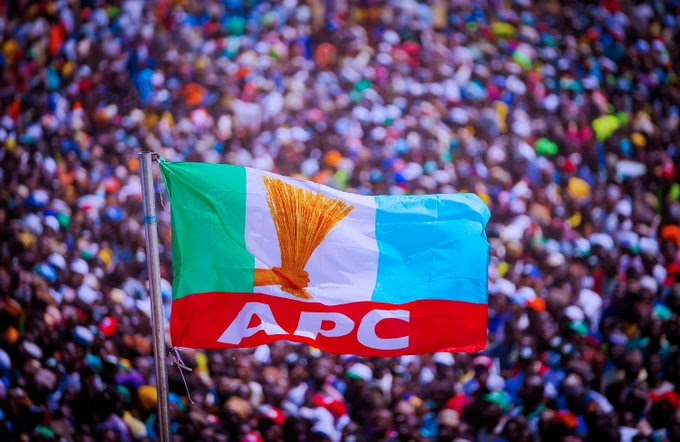Justice Aloku was once an influential business owner in the Nigerian printing press. He had three industrial printing shops in the popular Somolu Market, a suburb that hosts a large number of printers in the Somolu Local Government Area of Lagos State.
At the time his business was flourishing, Aloku had more than 100 casual workers and about 30 full-time workers; he was living the dream every businessman craved having built a reputable clientele base that made him one of the most sought-after printers in Somolu Market, and by extension, Lagos State.
He was known for printing popular Christian books, including the ‘Open Heavens’, a devotional guide by the revered Pastor E.A Adeboye.
But in an unexpected twist of events, the COVID-19 pandemic dealt a huge blow to Aloku’s burgeoning printing business.
As the world grappled with the deadly virus, restrictions and lockdowns were imposed as measures to guarantee human safety. Private and social functions were banned, among other avenues that Aloku’s business had been benefitting from.
Aloku’s business started witnessing a steady decline in patronage, as the printing of textbooks, notebooks and hymns was no longer fashionable, and in adjusting to the new normal, people resorted to digital methods of printing.
“Little by little, I watched as my business faded away for lack of funds, the high cost of machine and materials, with little or no capital turnovers from the jobs we did.
“I used to source and pay heavily for the jobs I did for clients who would not pay us until we finished their jobs, so we used our money to do the jobs and then got paid on a later day. I needed funds, but who would help you?
“I applied for a loan in 2017 from the Bank of Industries to help me buy a recent printing machine that could help my business; it took three years for the loan to come and it was paid straight to the company that supplied the machine, worth N7.1m.
“Then COVID-19 came and I couldn’t do anything. The machine didn’t work for long and developed faults that cost me almost N2m to fix. I could no longer manage my workers and had to relieve them without pay. Also, customers that I had an unwritten contract with all pulled out,” Aloku said, as a tear dropped from his misty eyes.
In a regrettable tone, Aloku said he sold his printing machines as scrap, adding that while trying to cope with the harsh reality of life, he fell into a coma for several months and battled a stroke.
After surviving the medical conditions, Aluko, who was once a business tycoon, said he was now an e-hailing driver and had been using the money he gets from the business to fend for his family.
Like Aloku, 40-year-old Agatha Adimike, who was working with a reputable printing firm, got relieved from her job because the pandemic affected her boss’ capacity to keep up with paying workers at the firm.
Adimike, who possessed 15 years of experience in the printing industry, said she became jobless shortly after she got married.
Unlike Aluko, who became a commercial driver, Adimike had become a fruit seller in Ikorodu where she relocated with her family.
She said, “I had just got married and was using part of the money I earned to support my husband who earned N50,000 as a teacher in one of the secondary schools in Somolu.
“Our company was already facing the crisis of lack of good clients, and my boss was borrowing heavily to do business for clients, who either paid lesser than spent or rejected the designs.
“My boss owed me three months’ salary when he relieved me of my job when the lockdown started. With no savings at hand and nothing else to do, I became devastated and confused.
“I remember sleeping without food for several nights. I was begging family, friends and church members to sustain myself and my husband. After the lockdown, I was pushed to start selling fruits. That is what I still do today.”
However, a 33-year-old printer, Oluwamayowa Raphael, said to survive as a printer, he combined his printing business with graphics design and social media.
Raphael, who is the Chief Executive Officer of D’Mayors House, was one of Aloku’s workers before the latter’s business sunk.
He said, “Before 2020, we saw it coming (the business crumbling) but we didn’t think it was going to hit us that much; it started with some of our clients withdrawing completely. It was a steady decline. Before then, we used to boast 50,000 to 70,000 copies of books to be printed between two and three months.
“It was a challenging time for me; I was a 300-Level student of Building Technology in Education at the University of Lagos, Akoka. It felt so bad because as a worker, I depended so much on my salary. There is a margin that needs to be filled in the printing industry that no one is attending to.
“We talked about it at the Printers Forum but nothing was done. I don’t go to their meetings anymore because they have not been of help. People go through rigorous processes to get loans from them, aside from the time frame which can range from two to three years; sometimes, if you don’t have connections with people who can stand as sureties for you, you end up not getting the loan.”
The Delta State-born businessman also revealed that the size of their machine puts them at risk of getting lucrative jobs from clients.
He added, “My friend and I got the machine for N4.7m, but it is now N5.2m and this is like the least of this type of machine. The machine is a six feet large format machine; we have 8, 10, and 12 feet and they are larger and very expensive.
“The competition is high with a small market and business is not how we hoped it would be. The size of the machine is a challenge for us; our clients would prefer to do business with people with bigger machines than trust us to deliver.”
Like in other countries, the pandemic shook the economy of Nigeria and affected several businesses; the printing industry in particular suffered a plunge.
But aside from the pandemic, printers in Nigeria struggled with the influx of foreigners into the business, poor electricity, and the high cost of rent and paper, among others.
Findings showed that digital printing machines like computer-to-plate, web-to-print printing machines, and digital colour separation machines drove lithographers, as well as experts in colour separation, into extinction from the production chain.
According to Index Box, in 2021, the Nigerien printing market decreased by -17.4 per cent, falling for the second year in a row after three years of growth.
Overall, consumption, however, continues to indicate a moderate expansion. From 2020 to 2021, the growth of the market remained at a somewhat lower figure.
The Chief Executive Officer of Dastar International Ventures, Seun Adewole, identified personnel as a major factor facing the industry.
Adewole said, “Work in the printing industry is not as easy as perceived. Sometimes, those that start up the business may not know how to run it. They have funds but they lack technical know-how, and they don’t know the inside out of the business, so when challenges come, the business is gone.
“I know a printing press whose owner returned from abroad and he thought he should establish the business with huge money. He got people to work for him but they ran the company down.
“So, apart from the owner of the business having the right knowledge about the technicality of the business, the workers constitute a major factor. Some of them steal; they move waste with paper to sell, and the owner will be running at a loss.
“Another aspect of personnel challenge is lack of continuity or progression plan in the industry. Youths are more concerned with fast money-making jobs, forgetting that handwork will give them something for the future; but they are not interested.”

In July 2021, reported that the Chartered Institute of Professional Printers of Nigeria lamented the influx of foreigners into the printing market.
The institute’s President and Chairman-in-Council, Olugbemi Malomo, who spoke at the institute’s annual national conference in Abeokuta, Ogun State, said the ease of doing business in the country had allowed foreigners to come in unhindered to the retail level, thereby denying the industry opportunity to build capacity.
According to him, the Nigerian printing industry employed over 10 million Nigerians within its value chain.
He, however, said the industry was under the siege of “a few foreigners” who had monopolised the market and made it impossible for Nigerians to freely import paper into the country.
Likewise, Celestine Udeme, the founder of Celama prints has been in the industry for more than two decades now but because of the fall in the patronage of local printers and printing firms, caused by the invasion of the industry by expatriates and high patronage of this foreign industries as compared to the locals, now combines his printing job with agriculture, real estate investment and consultancy jobs.
When he started in 2005 he had 30 staff members and 30 apprentices. However, since expatriates started flooding the market about a decade plus ago, his staff strength has reduced to 20 staff members and 10 apprentices.
The monthly income rate of his industry which used to be between N10m and N20m has also dropped to a monthly income of between N3m and N10m, which shows over a 10 per cent fall in revenue.
Speaking to our correspondent, he said, “I started my printing firm called Celama Prints in 2005 with no machines, which was ok as of that time because there was no funding. However, the business seemed so lucrative because we did not have these foreigners; Indians and Lebanese at that time. Suddenly they just came and dominated our markets and our people business owners prefer to patronise them.
“Before now, we used to have a monthly rate of about N10m to N20m, but now we have reduced staff strength, we used to have about 30 members of staff and 30 apprentices, but we now have a total of 20 staff members cutting across all machines and even some work on two machines and 10 apprentices because of the lack of inflow of revenue.
“Based on this factor, a lot of us, like I have had to diversify into other areas. I have gone into poultry farming, dry season farming and consultancy. I have taken most of the capital from printing into other investments. So the printing press is no longer my only source of income.
“In my press, I have all the machines to work with from the large format printers to the least of them all, the five colour figmas, etc.
“Nigerians and business people prefer to patronise foreigners because they believe they came with more efficient machines and have the technical know-how. But the truth is when they do so, they end up putting somebody like me who has the machines, skill, manpower and technical know-how at risk. Sometimes these expatriates charge them higher than we would.
“Truth be told, the business has gone so low and the revenue income in the printing industry has drastically fallen. A lot of people are running from it, even foreigners because of the drop in revenue. So the banks are in trouble too.”
Corroborating him, a printer at Bolaji around Somolu, Palm Groove area in Lagos, Andy Adeleye, accused the expatriates of hijacking the business.
He said, “Foreign intrusion is on the rise. These expatriates do business to snipe, dominate and kill the local industries. This is the major reason why the industry is endangered. The foreigners slash the prices for clients because they control the imports.
“They know where the papers are made and they get them at a very cheap cost; they use big machines of very high capacity and they even get regular and consistent power supply, which the locals cannot boast of.
“Our businesses are given to them because of their low cost of pricing. We buy at a higher cost and thus will have to make a profit, so we cannot match up with them
“Today, every input that goes into printing is imported: paper, ink, and the likes, and at a high rate for locals and that is where we have failed. People are hanging on because the business is expensive to close down.”
Adewole also told our correspondent that the government worsened the situation of local printers because they usually award contracts to foreigners.
He added, “In the early 70s, we had Onward Exercise Books, but they have stopped production now. Why? Foreigners have edged the local production out. Most of the books and texts used in Nigeria are produced by foreigners.
“They don’t pay as much tax as we pay. These Lebanese and Indians have paper mills in their countries and they move the papers to Nigeria at very minimal tax rates. These people are the ones in charge of producing and selling almost all the papers in Nigeria today.
“The government has a long way to go; they give out contracts to these foreigners too, they are not looking inwards. The government should work on paper; it is the most important material for printing.”
In March 2021, the Chartered Institute of Professional Printers of Nigeria, charged with regulating, controlling, and managing the affairs of printers and related matters in Nigeria, lamented the arbitrary increase in the cost of papers in the country.
In a statement titled, ‘Paper cartel, a threat to national security – CIPPON’, the institute declared that the cartel involved in the importation of papers was a threat to national security and cause of increasing job loss.
Also, in January 2023, CIPPON threatened to drag the Independent National Electoral Commission to court for allegedly printing a large chunk of its electoral materials overseas.
The agency said it was illegal and a violation of the CIPPON Act 24 of 2007 of the Federal Republic of Nigeria to print any electoral material outside the country.
Adeleye argued that the negligence of the paper mills by the policymakers and government contributed to the challenges facing the printing industry.
He said, “In the 1970s to the 1990s, the Federal Government saw the need to improve and revive the industry for future purposes and they established three paper mills to reduce the importation of raw materials to feed the sector.
“They established the Nigeria Paper Mill, Jebba, Kwara State, in 1969; Iwopin Pulp and Paper Company, Ogun State in 1975, and Nigeria Newsprint Manufacturing Company in Oku-Iboku, Akwa Ibom, in 1986.
“The question is how many of these are still functional today? The entire industry appears to be slowly moving to a final place of rest, some are there already, and it appears that the managers of these companies and the economy have lost hope in their revival or have comfortably discarded their contributions to the economy in the past and what it would add to the present.
“Our mills are all dead, and plantations that were supposed to grow the industry and make it sustainable have been sold out to foreigners. We planted a particular tree for a particular paper but they have been cut off, and sold out, to India and China, and other countries.
“As a result, there is no program for deforestation. So, we resort to importing papers, instead of investing in the growth and development of the nation.”
The Executive Secretary, Nigerian Publishers Association, Emmanuel Abimbola, urged the government to make the market flexible for locals to operate.
He said, “Local printers don’t have the capacity; they won’t meet up because they depend on imports: the paper, ink, and even the machines are all imported. Everything in the industry is almost 100 or 90 per cent import dependent.”
Speaking on loan availability, Abimbola decried the loan percentage rate which was between 28 and 30 per cent, noting that local investors are not given enough time to recoup before paying back.
“They don’t give them loans too. The government is not supporting the business; government needs to make loans available for publishing and printing and give the investors enough time to recoup; make money and pay their loans.
“Why the association doesn’t help or give loans is because it is just a trade association and not a bank. We only appeal to the government and see if the government will help our members. If you even look at the list of businesses on the Bank of Industry for loans, publishing and printing are not there. The association is therefore trying its best and hopes to achieve something soon.
“Today, only those that have stayed long in the business and have large capital are doing well. Those that have stayed 20 to 40 years and have the capacity for the business, that is, access to bank loans, machines, and others. However, they are still struggling because publishing and printing are completely import-dependent,” he added.
Abimbola advised the government to support small and medium enterprises in Nigeria and set up paper mills, adding that the ones in the country had become moribund.
He said, “Our government should copy from China and India. Their government is giving them support and that’s why they are thriving. They have the government’s support, and loans with very low-interest rates, unlike here where we have rates of 28 per cent and 30 per cent in this type of environment.”
Also, the President and Chairman-in-Council of the association, Olugbemi Malomo, said the Nigerian economy was harsh.
He said, “The economy is harsh and a lot of people are losing their jobs. Statistically, I can’t have a figure but I can tell you things have been on the downward side.
“Today, you can buy paper with the same retailer three times a day for different amounts because the cost of the paper is now dictated by what the exchange rate is saying.
“Some time ago, we met with importers and requested that they regulate paper prices monthly for three months which they agreed to, but later they returned to us and said because there was no law against the importation of paper, they were not going through with the agreement.
“However, we noticed that in the next three months from that time, even though the exchange rate was going up, the price of paper stabilised, which meant that if we had proper regulation and empowerment, they would not be exploiting us. They are doing what they like and are getting away with it because of a lack of proper regulation.”











